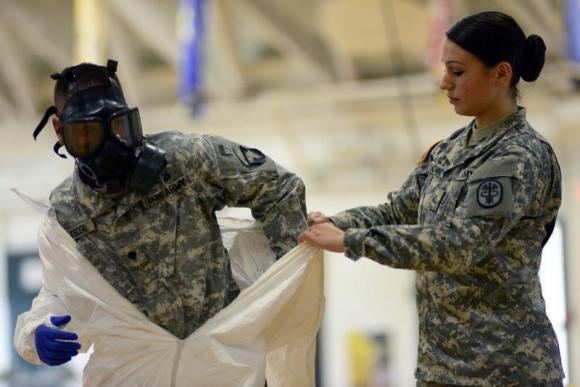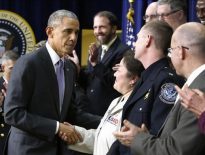(Reuters) – President Barack Obama is set to announce on Wednesday that he will bring back nearly all of the 1,300 U.S. troops deployed in West Africa to fight the Ebola epidemic by April 30, the White House said late on Tuesday.

Obama, who was excoriated last fall for a slow start to his Ebola outbreak response, will hold a White House event to showcase how U.S. leadership helped stem the epidemic, which has killed almost 9,000 people, mainly in Guinea, Liberia and Sierra Leone.
The number of new cases each week has dropped to about 150 in recent reports, down from more than 1,000 new cases per week in October, the White House said.
We are encouraged by the declining number of new Ebola cases in West Africa, but remain concerned about a recent increase in cases in Guinea, and an inability to further reduce case counts in Sierra Leone, the White House said in a statement.
Moreover, given that a single case can lead to flare-ups of the virus, we must not lose focus, the White House said, noting about 100 U.S. military personnel will remain in West Africa to help.
At the height of the epidemic, about 2,800 military personnel were deployed to West Africa.
Troops built 10 Ebola treatment units and a medical unit to treat infected healthcare workers.
At least 10 people are known to have been treated for Ebola in the United States, four of them diagnosed with the disease on U.S. soil.
Only two people are known to have contracted the virus in the United States – both of them nurses who treated an Ebola patient from Liberia who became sick and died in Dallas.
After that incident, which happened during the U.S. midterm election campaign, Obama named former White House adviser Ron Klain to coordinate government activities. Klain’s job is slated to wrap up this week.
Obama secured more than $5.4 billion from Congress to fight the disease in West Africa and at home. Some of those funds are being used to support the development of Ebola vaccines and therapeutic drugs.
This money will still be used as we do the hard work of trying to get to zero [Ebola cases] and continue to invest in domestic preparedness for this and other highly infectious diseases, an administration official said, speaking on background.
The government has worked to train U.S. hospital workers to detect and handle Ebola cases, and ramped up screening of people returning from countries where Ebola raged.
About 7,700 people returning from Ebola-afflicted countries were screened at U.S. airports and were required to watch for symptoms and report to health authorities for 21 days.
(Reporting by Roberta Rampton; Editing by Sandra Maler and Eric Walsh)





